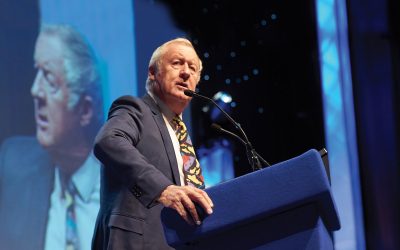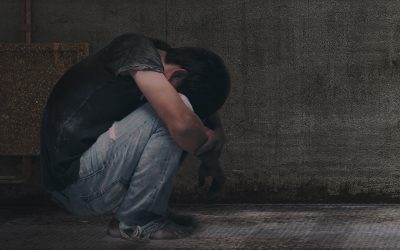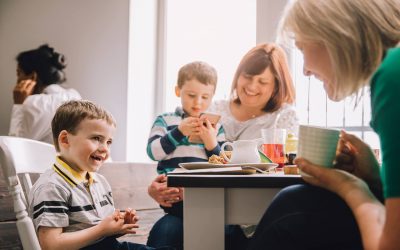Nine o’clock on a bracing Friday morning in the Peak District, and already an array of volunteers are hard at work packing blue container boxes.
They’re the size of those storage boxes you buy to pack away the Christmas decorations. But here, in an unremarkable industrial unit situated just outside Matlock, their work is both life-changing and life-saving.
This is the headquarters of Aquabox, a Rotary-inspired charity which, for 26 years, has sent more than 110,000 humanitarian aid boxes to disaster zones around the world.
Earthquakes, flooding, drought, typhoons, hurricanes and war, Aquabox has seen it all. Loss of life, lack of food, severe water shortages.
Working with aid agencies in these stricken zones, the Derbyshire-based charity sends the blue boxes containing aqua filters, plus humanitarian aid including cooking utensils, hygiene equipment, tools, shelter materials, baby and children’s clothing, as well as educational items.
“When we started off the charity we began sending out basic aid items, such as cooking stuff and tarpaulins to survive,” explained trustee Roger Cassidy, who is a member of the Rotary Club of Wirksworth, which kicked off the venture in 1992.
“But then as time went on and we got more feedback from the field, we discovered that educational items also became important.
“So we send out books, envelopes, pens and paper and things like that.
“When children are in a camp with nothing to do, this is a way of establishing as much normality as possible.
“The other thing we got feedback about was sanitation items. Things like soap, toothbrushes and toothpaste, basic items which you need when you have been through a dreadful disaster like the hurricane in the Caribbean.
“It enables people to establish a little more humanness to their lives.
“The most recent addition has been adding a solar lamp.
If you’re in disaster situation, the first thing that goes is the infrastructure and fresh water. Children and adults die of thirst, of typhus and cholera – you can’t go for very long without clean drinking water.”
“Rather than putting in candles and matches, which is what we used to do, we added solar lamps a couple of years ago.
“A lot of these disasters occur in countries where there is a lot of sunshine.
“We have also added bamboo cups and bowls, instead of tin items, trying to be more environmentally-friendly.”
At the heart of the Aquabox operation are the water filters. When the charity first began, the original boxes had a tap on the side, water would be poured into the box mixed with a chlorine tablet.
The bottom line in any disaster is that the greatest number of deaths occur through water-borne diseases. So, ensuring a safe and reliable source for drawing water in a disaster zone, is a priority.
The pumps, which cost £25 each, are assembled manually in Wirksworth by a mixture of Rotarians, Inner Wheel volunteers and church groups from across the Peak District.
According to one of the assemblers, Mick Brittain, the parts are pretty robust. Within each water filter there is a backflush mechanism to ensure its longevity of up to three years by expelling any muck on the membrane.
“We’ve got pumps operating in The Gambia which have been going for six years,” explained Mick. “It is a wonderful product – so simple, and it is a life saver.
“If you’re in disaster situation, the first thing that goes is the infrastructure and fresh water. Children and adults die of thirst, of typhus and cholera – you can’t go for very long without clean drinking water.
“The water filters are not just used for disaster areas. I was involved in a project in rural Botswana where they had wells, but the water was dirty. So they were using dirty water to take their polio medication.”
Twenty five years on, Aquabox now runs a very sophisticated operation.
It is a far cry from the early days when boxes were packed in a cow barn in Wirksworth as well as elsewhere by Rotary clubs, church groups and other voluntary organisations.
There are Aquabox organisations in Canada and Australia.
While in the UK, groups such as the Rotary Club of Gloucester are also involved in box packing.
Aquabox have shipped out more than 1,200 boxes over the past six months.”
It is an outstanding success story which was rewarded when Aquabox received the Queen’s Award for Voluntary Service in 2016. But far from looking back, Aquabox is looking forward as there is an even greater need for the boxes.
“When we first set up, we were dealing with natural disasters,” added Roger Holden. “But over the last five years, with the dreadful events in Syria, and more recently in Bangladesh, with the Rohingya people in Myanmar, as well as the war in Yemen, we are responding more to man-made disasters, than the terrible earthquakes or tsunamis 10 years ago.”
In the early days, Aquabox had to deal with getting the boxes through customs.
Now their biggest issue is getting the aid to politically unstable areas through partners, such as the United Nations High Commissioner for Refugees.
On one occasion, when sending boxes to refugee camps in Mogadishu, Somalia, they had to glue large washers over the Rotary symbol on the blue boxes because the Jihadist militant group, Boko Haram, associated Rotary with the USA and it was feared they would exact retribution.
Trustee John Holden revealed that the demand for aid has been massive as they have shipped out more than 1,200 boxes over the past six months.
As for the future, he said they were looking for greater involvement from other Rotary clubs to serve as satellite box-packing groups, as well as creating a team of regional ambassadors.
They also want to have stocks of the boxes stored overseas at key sites to enable quicker deployment to disaster zones.
John detailed that it costs Aquabox around £300,000 a year to operate, and they need to continue to drive more income to support their valuable work.
“Aquabox captures all of the elements of Rotary,” he added.
“People freely giving their time to help other people and trying to put a degree of professional skills into that equation to make a difference in the world.”


























































